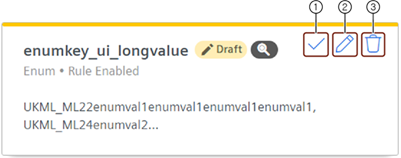Overview¶
Metadata keys are the unique identifiers used to represent key-value pair structure, representing specific attributes or characteristics linked to data. They are a part of a global or custom collection and are used to create rules in a custom collection. Metadata key is a reference point for a specific metadata information to categorize and describe the specific metadata information to various aspects of the data.
For global collection, the Integrated Data Lake admin is not required to create the collection to add the metadata key and can directly use the global collection ID. For custom collection, the Integrated Data Lake admin should create a custom collection and then add a metadata key to the collection. To include metadata in Integrated Data Lake resources, users should define metadata keys either in the global or custom collection.
The key in a global or custom collection is shown below:

① Publish the key.
② Edit the key.
③ Delete the key.
Note
- When the selected key is in draft status, publish, edit and delete options are enabled.
- When the selected key is in published status, only edit option is enabled.
Key parameters¶
Consider the following parameters when adding a key to metadata collection.
Data type values¶
Metadata key should be defined with a data value type as mentioned in the below table:
| Data type | Field Name | Field Values |
|---|---|---|
| Enum values | options | The values accepted for the "Enum values" data type are in capitals and separated by commas. |
| Enum list values | options | The values accepted for the "Enum list values" data type are in capitals and separated by commas. |
| Minimum Size | The minimum number of values that are selected from the enum list should be greater than 0 and less than the total number of options. | |
| Maximum Size | The maximum number of values that are selected from the enum list should be greater than minimum size and less than or equal to number of options. | |
| String values | options | The values accepted for the "String values" data type are in capitals and separated by commas. |
| Minimum length | The minimum length of character set in the list that is accepted as value should to be greater than 0. | |
| Maximum Length | The maximum length of character set in the list that is accepted as value should to be greater than or equal to minimum length. | |
| List of String | options | The values accepted for the "List of String" data type are in capitals and separated by commas. |
| Minimum Size | The minimum number of values are selected from the list of string has to be greater than 0 and less than number of options. | |
| Maximum Size | The maximum number of values are selected from the list of string should to be greater than minimum size and less than or equal to number of options. |